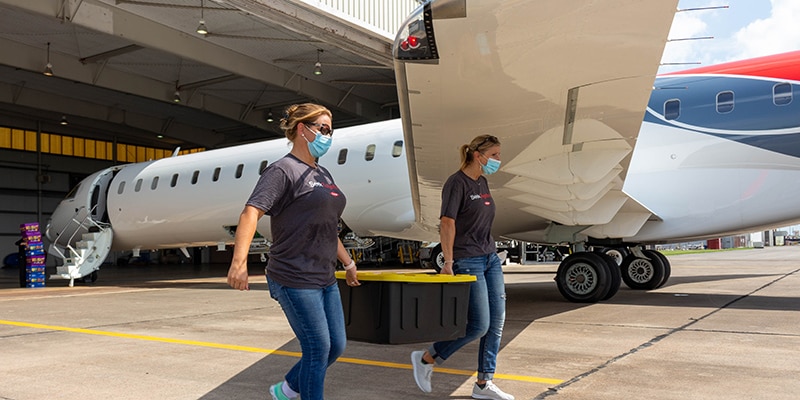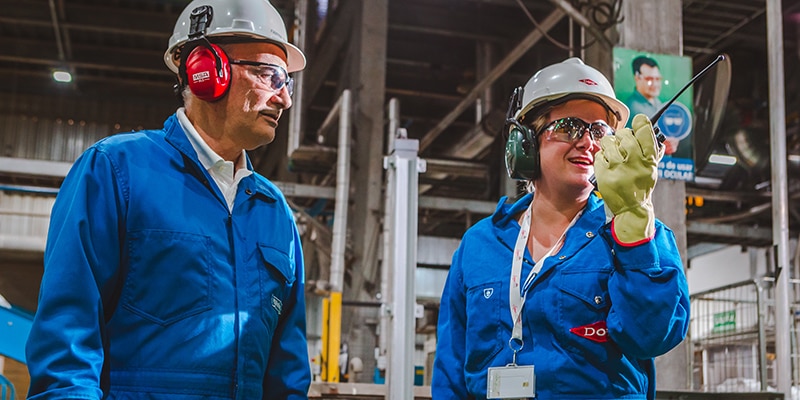
Attracting talent to the Chemicals and Plastics industries
Technology is rapidly evolving across many industries, creating a competitive employment landscape for the recruitment and retention of talent with science, technology, engineering and maths (STEM) expertise. Research from Dow has identified that the Chemicals and Plastics industries in Europe* need to attract more than 1.72 million people by 2035, primarily to support sustainability initiatives and fulfil recruitment demand. The ‘Moulding the Future’ report, which was commissioned by Dow and developed in collaboration with economic consultancy Development Economics, clearly indicates significant future jobs growth in these industries and a notable expansion in green jobs specifically.
CHALLENGE
Growing need to attract younger people
The research indicates that younger and more diverse talent will be key to progressing innovations and technologies that reduce CO2 emissions and accelerate the circular economy, as well as being essential to replace employees seeking retirement.
Specifically, the projected growth of jobs in the sector shows that the Chemicals and Plastics industries will need to attract over 1.05 million young people (those aged up to 25 years)1 in order to fulfil demand.
Of the overall 1.72 million jobs being generated by the Chemicals and Plastics Industry by 2035, nearly 200,000 will be newly created roles. Of the new jobs being created, Spain and Germany will lead green jobs boom, with Spain seeing the creation of just under 100,000 new roles by 2035. Germany is set to add more than 60,000 new jobs, while the UK will add more than 12,000** new jobs.
But how do younger people view the industry?
Dow’s polling of young people across Europe*** found that despite the growing job demand, the Chemicals and Plastics industries are currently not the top choices for young people.
- Three quarters (74%) of young people in Europe think it’s important to work in an industry where they can have a positive impact on the environment. However, less than a third (29%) of young people think materials science (including the Plastics industry) can have a positive impact on the environment.
- Only half of young people (51%) said they would find a career in materials science appealing, suggesting that Plastics and Chemicals companies could be missing out on new talent.
- More than a third (37%) of young people think the industry would be more attractive if they could find out more about the technologies the industry is working on to make plastics more sustainable.
Evidently the plastics and chemicals industries need to work hard to attract younger talent and avoid missing out. The research suggests that one way of doing this is to communicate more effectively around the potential of the technologies we are working on. Almost three-quarters (71%) of young people said that Advanced Recycling technology, which turns plastic polymers back into their original molecules so they can be re-used, sounds exciting to them. This is a key area that Dow and the wider industry is investing in, alongside other innovative technology solutions.
SOLUTION
Imagine Better: There’s more to be done to diversify the workforce
Importantly, it’s not only a younger, but also a more diverse workforce that the Plastic and Chemicals industries need to attract. Other findings from the report show that both industries are proportionately still dominated by men, in fact, only a quarter (26%) of the plastics industry is currently female. However, projected increases in female enrolment on science, technology, engineering and mathematics (STEM) degree courses suggest that women could account for at least 43% of recruitment by 2035. This would mark a positive step forward for the industry.
Luisa Boaretto, Dow Regional Inclusion and Diversity and Employee Experience - EMEAI, says:
“We are committed to investing in and scaling innovative, new technologies to decarbonize our sector and accelerate the move to a more circular economy for plastics. Scaling technologies like Advanced Recycling will be critical to making our industry more sustainable, but we know we need the best talent to help us realize these ambitions.”
“While the Chemicals and Plastics Industry has made positive steps forward from an equality point of view in recent years, with many women holding leadership positions, Dow’s ‘Moulding the Future’ report clearly shows that there is not enough gender diversity in our industry. This is something we need to be focusing on significantly over the coming years and working hard to change. Both Dow and the industry more widely need to do more to harness diversity of thought, experience and background in order to approach sustainability challenges in new ways. We want to inspire young people and particularly women, to join our industry and help us achieve our goals. It’s now up to us to demonstrate that by choosing a career in materials science, young people can have a positive impact and help shape the future of one of the largest industries in Europe.”
Cindy Gonzales, Senior Production Engineer, Dow Germany, says:
“One of the reasons I’m proud of working at Dow and being part of the Plastics and Chemicals Industries is that I get the chance to make a positive impact on the environment. Recently I was working on a project with the goal to improve Dow’s carbon footprint by using a new technology in our furnaces. It was exciting to be a part of a project like this and to play a role in its implementation, as you could see and appreciate the tangible difference your work was making. What’s more, every day is different, so you never get bored. One day I may be working from an office, the next visiting one of Dow’s plants, the next visiting a site of a customer. It’s great to have the variation and I’m excited to progress my career and continue to work on other exciting and impactful projects here.”
Carles Alabau, Business Development Manager, Dow Spain, says:
1 Of the overall demand for just over 1.72 million recruits, nearly half (47%) of all demand – i.e., 800,000 recruits in total – is expected to be for Managerial, Professional and Associate professional roles.
* The report looked at 7 markets: Belgium, France, Germany, the Netherlands, Spain, Sweden, and the United Kingdom.
** Rounded to the nearest 100
*** Poling conducted with Focal Data
About Development Economics
Development Economics Ltd is an independent research consultancy providing economic and demographic research, market analysis and consultancy advice for corporate, public and third sector clients. Services include labour market and skills analysis, demographic and social research, and the production of economic impact assessments, feasibility studies, demand assessments and funding bids. Regular corporate clients include AstraZeneca; Barclays Bank; IWG/Regus; McDonald’s Restaurants; Mondelez; Digital Realty; Scottish Power; and National Grid.
Development Economics Methodology
The ‘Moulding the Future’ report was produced in August 2021 and provides estimates of the potential future demand for workers on the Chemicals and Plastics products industries in seven markets (Belgium, France, Germany, the Netherlands, Spain, Sweden and the UK.) This research is part of a study that has been undertaken on behalf of Dow Chemicals, as part of initiative that is focused on attracting new talent to the Chemicals industry. The types of vocational occupations required by employers operating in these industries is wide-ranging, with the most numerous roles including job types such as the following:
- Production managers and directors in manufacturing
- Chemical scientists
- Biological scientists and biochemists
- Programmers and software development professionals
- Laboratory technicians
- Engineering technicians
- Quality assurance technicians
- Science, engineering, and production technicians
- IT user support technicians
- Buyers and procurement officers
- Chemical and related process operatives
- Metal working machine operatives
The focus of the study is on overall net recruitment needs at an industry level. Therefore, the quantification of future recruitment demand necessarily excludes the effects of the intra-industry movement of workers – i.e., the movement of workers between different businesses within the Chemicals and Plastic Products sectors.
Focal Data Methodology
This survey was conducted in February 2022 using an online interview administered by Focaldata. Our platform collects data from our commercial suppliers, such as traditional online panels and programmatic sampling platforms. We then use machine learning to filter out bad respondents and get as representative a sample as possible. Users fill out the surveys in real-time across mobile, desktop, and tablet devices on the Focaldata platform.





